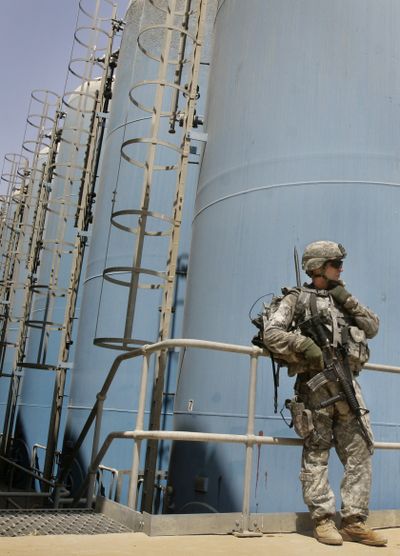Officials tackle Iraq water issues
Long-term distribution remains problematic

BAGHDAD – The tanks were full of enough clean drinking water for some 200,000 Iraqis at a new distribution station in eastern Baghdad, but local officials struggled Saturday to agree on where it should go.
U.S. soldiers and Iraqi officials began working on the water distribution site in the former Shiite militia stronghold of New Baghdad in April – part of a broader strategy to provide immediate relief in hopes of boosting confidence in the Iraqi government and preventing militants from regaining support.
Iraq’s government provided $191,000 for the project, which is located on a joint U.S.-Iraqi military base in the area.
Water can either be collected by people filling containers from three public taps on the base or from tanker trucks that will deliver it to collection points elsewhere in the neighborhood.
American officials acknowledge it’s a short-term solution. Better if people could receive clean water through their faucets at home.
But the Americans say the distribution system will at least provide Iraqis breathing room to improve infrastructure that has been devastated after more than five years of violence.
Officials need “to rapidly and responsibly meet the needs of the Iraqi people” but also to “sustain, to plan, to budget, execute and provide those services for the people,” said Brig. Gen. Robin Swan, a deputy commander for the 4th Infantry Division in Baghdad.
Iraqis have been able to use the taps at the facility, which has a storage capacity of about 52,800 gallons. But the local municipal council hasn’t decided how many trucks can be used and where they should deliver the water.
“The challenge has been to come up with a distribution plan,” said Maj. Gary Giles, a civil affairs officer with the 4th Brigade Combat Team, 10th Mountain Division, which is spearheading the project. “Here we’re having some fits and starts.”
But Giles was optimistic the issue would be resolved so the trucks can start delivering water by the end of the week.
Mudhafer Ali, the official in charge of the Baghdad water pipes network, said the water would be distributed by trucks carrying nearly 4,000 gallons each and there was a plan to eventually expand the project to provide irrigation water.
“There is an agreement to use five trucks that will work for eight hours to deliver water to the residents,” he said.
Filthy drinking water, often contaminated with sewage that overflows into the Tigris River, has raised fears of cholera and other diseases. Baghdad’s network of aging pipes also suffers damage because poor and displaced Iraqis frequently tap into it illegally.
The Iraqi government has invested or plans to invest more than $200 million, in addition to $50 million in U.S. military emergency funds. More than 100 projects are in the works to improve the capital’s water supply, according to the U.S. military.
Two-thirds of the raw sewage produced in the capital flows untreated into rivers and waterways, Stuart Bowen, special inspector general for Iraq reconstruction, said in his quarterly report released last month.